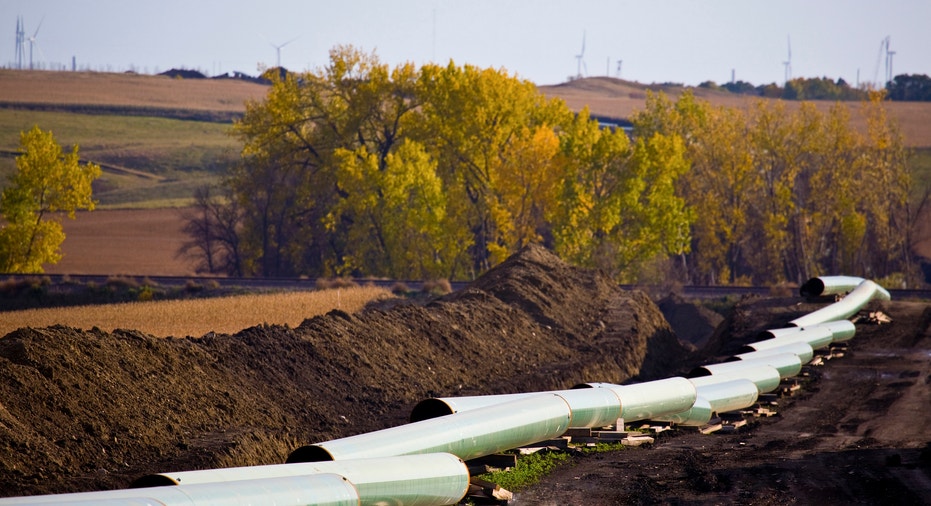TransCanada Requests Suspension of Keystone XL Permit

The Canadian company behind the proposed Keystone XL pipeline on Monday asked the U.S. government to suspend review of the $8 billion project that sparked a political war between environmentalists and the oil industry, a move that could put its fate in the hands of the next U.S. president.
TransCanada's move was seen by many as an attempt to avert a rejection from an increasingly environmentally focused President Barack Obama and postpone the decision until after the November 2016 presidential election.
Democratic front-runner Hillary Clinton has said she opposes the pipeline while many Republican candidates support the project for making America less reliant on the Middle East.
Calgary-based TransCanada said it had sent a letter to the U.S. State Department to suspend its application while the company goes through a state review process in Nebraska.
The State Department was reviewing TransCanada's request but still assessing the project, a representative said.
The nearly 1,200-mile (2,000-km) pipeline would carry 830,000 barrels a day of mostly Canadian oil sands crude to Nebraska en route to refineries and ports along the U.S. Gulf Coast.
Green groups issued a blizzard of statements describing TransCanada's move as a desperate attempt to avoid a "no" decision, and urging the president to kill the project anyway. Democrats hours after the move sent an email urging supporters to sign an online petition to fight climate change.
In addition to political headwinds, U.S. crude prices have plunged to $50 a barrel from almost $150 when TransCanada filed a federal application in 2008. The project also faces several lawsuits.
In the past year a global rout has slashed oil prices by more than 60 percent, prompting drillers to curtail spending and rein in new projects. Companies operating in Canada's oil sands where production costs are high have been hard-hit by the market conditions. Further postponing Keystone deals an additional blow to these producers who have limited pathways to bring their oil to U.S. markets.
The request for a delay came on the eve of TransCanada issuing an earnings report, and shortly after the White House said it still expected Obama to make a decision on whether to grant the permit before he leaves office in January 2017.
Asked if TransCanada was asking for a delay because of concerns Obama may block the pipeline, TransCanada spokesman Mark Cooper said the company was not going to speculate on what the decision may be or when it may come.
KEYSTONE A SYMBOL
TransCanada's request provoked a sharp reaction from environmental groups, which have made Keystone a symbol of their battle to keep crude oil in the ground. Canadian oil sands have long been under fire from environmentalists because of their carbon-intensive production process.
"TransCanada acknowledged the writing on the wall by requesting to suspend the review of its permit application," said a statement issued by Tom Steyer, the billionaire green activist who heads NextGen Climate. "Today, tomorrow or next year, the answer will be the same: Keystone XL is a bad deal for America, our climate, and our economy."
The pipeline's defenders tried to rally on Monday. North Dakota Senator Heidi Heitkamp, a Democrat, said "halting a basic infrastructure expansion project will not make this country more energy efficient or independent, but it does set a foreboding precedent about our ability to achieve those goals."
Republican candidates Ben Carson, Marco Rubio and Jeb Bush have said they support the pipeline. Donald Trump said in October that the United States needed a "better deal" from the pipeline's developer. In the past, he said he would approve the project immediately if he wins the election.
But environmental groups argued that TransCanada was simply playing for time - and the hopes that might come with a new president.
"TransCanada rightly sensed that the tide has turned againstKeystone XL and now they're trying to delay any decision in the hopes that they can get a Republican president to approve it," said Valerie Love with the environmental group Center for Biological Diversity. She urged Obama to reject the appeal and the pipeline.
Even investors were caught by surprise.
"Though I didn't see this coming it would seem to me to be an admission that they are giving up on the Obama administration," Ryan Bushell, a portfolio manager with Leon Frazer & Associates, which owns a significant position in TransCanada. "Not sure what this means for the stock if anything, but it's disappointing for the industry."
TransCanada's stock was little changed in after-hours trading.
(Writing by Bruce Wallace; Additional reporting by Euan Rocha in Toronto and Jessica Resnick-Ault in New York; Editing by Jeffrey Hodgson, Peter Henderson and Lisa Shumaker)



















